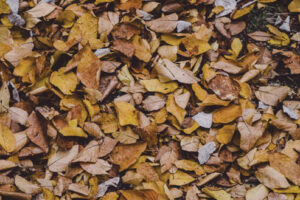
By Jeanette Castanon
Approximately 75% of the nutrients a tree takes up during the season are stored in its leaves. When you fertilize your landscape, a portion of that fertilizer is used to make leaves, which are then shed in fall. These fallen leaves represent a natural, organic source of nutrients for your landscape. If you bag them for curbside pickup and let your fees pay to have them picked up and hauled away, you’re just “renting” fertilizer, not buying it! In natural settings like forests and meadows, we see the leaf cycle operating as it was designed to do from the beginning. Leaves drop and collect as mulch, protecting soil from crusting, erosion, temperature extremes, drying out, and compaction. In time they decompose, slowly releasing nutrients to growing plants. No one fertilizes and mulches the forest. No one bags it either! You can put this natural cycle to work for you.
The simplest way to recycle leaves is to mow over them. It is amazing how fast and effectively a mower will make leaves disappear into the turf. Mulching leaves will not harm turf and in fact can benefit it by mulching thin spots, thereby discouraging weed seeds from sprouting. Try mulching and you’ll never go back to raking!

Another method of leaf recycling is to collect them and use them for mulch. The old fashioned method of raking the yard works fine of course but there are easier ways. Your standard type mower can be used to blow them into windrows for fast, easy collection. Or, a bagging mower can be used to gather leaves. Mulch flower beds about two inches deep. Gardens should receive two or three inches and shrubs and trees three to four inches. If you have any extra leaves left over, which is very unlikely, save them to replenish mulched areas when the weather gets hot in June
A third leaf recycling technique is composting. There are numerous approaches to composting including sheet composting, trench composting and composting in traditional heaps and bins. Sheet composting means spreading a thin layer of leaves over the garden and rototilling it in. Then repeat with another layer. The leaves will decompose over a month or so making the garden soil richer. Trench composting is filling a trench with leaves and then covering it with a thin layer of soil to speed decomposition.
If you rake up any leaves this fall season that the West Texas Food Bank would be happy to accept any offers of fallen leaves!



